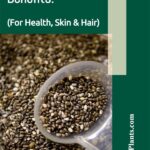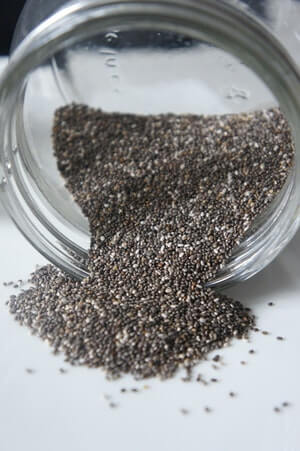
Chia seeds are not only a nutritious and healthy food that you can easily add to many of your favorite foods, but they also have great benefits for the stomach as well!
In this post, we will explore the benefits of chia seeds for stomach health, what those benefits are, why they exist, and how they can help keep you regular.
- The Benefits of Chia Seeds for the Stomach
- Chia Seeds and Leaky Gut
- Chia Seeds for Bowel Regularity & Movements
- Final Thoughts
The Benefits of Chia Seeds for the Stomach
Chia seeds are a rich source of dietary fiber, which can be beneficial for the stomach. The high fiber content in chia seeds can help to promote regular bowel movements, relieve constipation, and prevent the formation of diverticulitis (small pouches in the colon wall). Chia seeds can also act as a prebiotic, promoting the growth of beneficial bacteria in the gut.
Chia seeds are also high in omega-3 fatty acids, which can help to reduce inflammation in the stomach and intestines. This may be beneficial for those with conditions such as irritable bowel syndrome (IBS) or inflammatory bowel disease (IBD). (See Are Chia Seeds Good for IBS?)
In addition, chia seeds are a good source of antioxidants, which can help to protect the stomach lining from damage caused by free radicals. The antioxidants in chia seeds can also help to reduce the risk of stomach cancer.
Chia seeds can also be useful for weight management, as they are low in calories and high in fiber. The high fiber content in chia seeds can help to promote feelings of fullness, which can reduce the overall calorie intake. (See How to Use Chia Seeds for Weight Loss)
It is important to note that while chia seeds can be beneficial for the stomach, they should be consumed in moderation. Eating too many chia seeds can cause digestive discomfort such as bloating, gas, and stomach cramps. (See How Much Chia Seeds Per Day)
You may even want to start with just 1 teaspoon of chia seeds each day to see how your system responds.
Additionally, it is important to drink enough water when consuming chia seeds, as they absorb a large amount of liquid and can cause constipation if not consumed with enough water. (See The Benefits and Side Effects of Chia Seeds)
One way you can also help this is to soak chia seeds in water before consuming them. This will make them easier to digest and also will provide you with more water. (See Benefits of Chia Seeds Soaked in Water Overnight)
In summary, chia seeds are a great source of dietary fiber, omega-3 fatty acids, antioxidants, and have a low calorie content which makes them a beneficial food for stomach health. They can help to promote regular bowel movements, relieve constipation, protect the stomach lining from damage, reduce inflammation, and support weight management.
It’s important to consume chia seeds in moderation and drink enough water to avoid digestive discomfort. (See Are there Dangers of Chia Seeds? What You Should Know)
Chia Seeds and Leaky Gut
Leaky gut, also known as increased intestinal permeability, is a condition where the lining of the gut becomes damaged, allowing harmful substances to enter the bloodstream. This can lead to a variety of symptoms including inflammation, autoimmune disorders, and food sensitivities.
Chia seeds may be beneficial for those with leaky gut due to their high fiber content. The fiber in chia seeds can help to promote regular bowel movements, which can help to remove toxins and harmful substances from the gut. Additionally, chia seeds can act as a prebiotic, promoting the growth of beneficial bacteria in the gut. This can help to improve the health of the gut lining, which can reduce the risk of leaky gut.
Chia seeds are also high in omega-3 fatty acids, which can help to reduce inflammation in the gut. This can be beneficial for those with leaky gut, as inflammation is a contributing factor to the development of this condition. The omega-3 fatty acids in chia seeds can also help to reduce the risk of autoimmune disorders, which are often associated with leaky gut.
Chia seeds are also a good source of antioxidants, which can help to protect the gut lining from damage caused by free radicals. Antioxidants can help to reduce the risk of leaky gut by preventing oxidative stress, which can damage the gut lining.
It is also important to note that chia seeds are gluten-free, which can be beneficial for those with leaky gut as gluten can exacerbate gut inflammation and damage.
However, it is important to note that consuming chia seeds in large amounts may not be suitable for everyone, particularly for those with leaky gut. People with leaky gut should consult with a healthcare professional before adding chia seeds to their diet. It is also important to drink enough water when consuming chia seeds, as they absorb a large amount of liquid and can cause constipation if not consumed with enough water.
So in essence, chia seeds may be beneficial for those with leaky gut due to their high fiber content, omega-3 fatty acids, antioxidants, and gluten-free characteristic. They can help to promote regular bowel movements, reduce inflammation, protect the gut lining from damage, and promote beneficial bacteria growth.
Chia Seeds for Bowel Regularity & Movements
Chia seeds are known for their high fiber content, which can be beneficial for bowel regularity. Fiber is essential for maintaining a healthy digestive system, and it plays an important role in promoting regular bowel movements.
Chia seeds are a great source of both soluble and insoluble fiber. Soluble fiber helps to form a gel-like substance in the gut, which can slow down the passage of food and promote feelings of fullness. Insoluble fiber, on the other hand, provides bulk to the stools and helps to promote regular bowel movements.
Constipation is a condition characterized by infrequent, hard, or difficult to pass stools. The high fiber content in chia seeds can help to relieve constipation and promote regular bowel movements. This is due to the ability of the fiber to absorb water and increase the bulk of the stools, making them softer and easier to pass. (Do Chia Seeds Help You Poop?)
Consuming chia seeds can also help to prevent the formation of diverticulitis, which are small pouches in the colon wall caused by a low-fiber diet. The high fiber content in chia seeds can help to prevent these pouches from forming, by promoting regular bowel movements and reducing the pressure on the colon.
Chia seeds can also act as a prebiotic, promoting the growth of beneficial bacteria in the gut. This can help to improve the health of the gut, which can in turn promote regular bowel movements. The omega-3 fatty acids in chia seeds can also help to reduce inflammation in the gut, which can be beneficial for those with conditions such as irritable bowel syndrome (IBS) that can affect bowel regularity.
It is important to note that while chia seeds can be beneficial for bowel regularity, they should be consumed in moderation. Eating too many chia seeds can cause digestive discomfort such as bloating, gas, and stomach cramps. Additionally, it is important to drink enough water when consuming chia seeds, as they absorb a large amount of liquid and can cause constipation if not consumed with enough water.
To sum up, chia seeds are a great source of dietary fiber, which is essential for maintaining a healthy digestive system and promoting regular bowel movements.
Final Thoughts
In conclusion, chia seeds are a great source of dietary fiber, omega-3 fatty acids, antioxidants, and have a low-calorie content which makes them a beneficial food for stomach health. They can help to promote regular bowel movements, relieve constipation, protect the stomach lining from damage, reduce inflammation, and support weight management.
However, it is important to consume chia seeds in moderation and drink enough water to avoid digestive discomfort. (See Side Effects of Chia Seeds in Females – What to Be Aware of for more)
Lance has been passionate about the plant-based diet and we have been following a whole food plant-based diet for over 5 years. We focus on health, natural healing, weight management, animal rights, and the health of the planet and environment by focusing on whole plant-based foods and sustainable practices.
Learn more at the About Me page and follow on social media at the links below.






